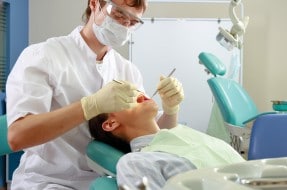Call now on0800 051 8069
£39,750.00 AWARDED FOR FAILURE TO DIAGNOSE THE EXTENT OF PERIODONTAL DISEASE AND PROVIDE APPROPRIATE TREATMENT
-
A blog by Sophia Courtaux regarding a recently settled periodontal claim.
Sophie Angwin-Thornes, acted for a client in relation to the failure by her dentist to diagnose the extent of periodontal disease (commonly known as gum disease) and provide appropriate treatment between 2008 – 2017, which contributed to the development of periodontal disease and the deterioration of her dental condition leading to significant pain and suffering and resulting in the loss of 12 teeth. She achieved a settlement of £39,750.00.
The client had been a regular attender and only became aware of the true extent of her gum disease when she was seen by different specialist at the same practice. The client was advised that she had severe bone loss and generalised severe chronic periodontitis. The client required extraction of 12 teeth. There was also a 25% chance of losing a further 4 teeth.
The client had to undergo invasive and avoidable dental treatment to restore her dentition, and required 8 implants.
The client will now require long term treatment in order to maintain and retain her remaining teeth.
What are the symptoms of periodontal disease?
The symptoms of periodontal disease include:
- red and swollen gums that may be highly painful and bleed when cleaning;
- bad breath that won’t go away – this is because periodontal disease causes ‘pockets’ in the teeth and gums which trap food and bacteria, which can then omit an odour;
- painful abscesses that discharge pus, which is released when your gums try and fight the bacterial infection;
- receding gums and sensitivity – which is a sign that the supporting tissues around your teeth are damaged;
- loose teeth.
If you are concerned that you may be suffering from periodontal disease, you should speak to your dentist about this. If, upon speaking to them, you are still concerned that they are failing to diagnose the disease, you should seek a second opinion as soon as possible.
What treatment should follow a diagnosis of gum disease?
If you have been diagnosed with gum disease, then you should be fully informed of the nature of the disease, the risks, and methods of self-prevention. These self-prevention methods will include oral hygiene advice, advice about quitting smoking, and dietary advice.
A detailed assessment of the gums should be carried out, along with the taking of radiographs and the provision of thorough cleaning of the teeth and gums, which may need to be done under local anesthetic.
Following assessment, periodontal treatment (such as scaling, root planing and antibiotic therapy) should be commenced. If there is no significant improvement a referral should be made to a periodontal specialist.
There is no cure for gum disease, but early intervention can prevent the disease from developing further, which sadly did not happen in the case above and resulted in the client loosing 12 teeth.
OUR EXPERIENCE
As specialist dental negligence solicitors we unfortunately see many clients who are suffering from untreated and undiagnosed periodontal disease. If you are concerned that your dentist has failed to diagnose or adequately manage your periodontal disease, please contact us so that we can investigate this further for you.







